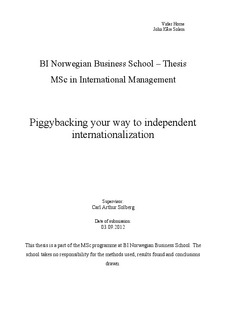Piggybacking your way to independent internationalization
Abstract
The purpose of this study has been to increase the understanding of piggybacking in international market entry. A piggybacking relationship consists of two partners, a rider (SME) and a carrier, where the rider exploits the marketing system of the carrier. Piggybacking comes in different forms, but our focus has been piggybacking as a mean to enter the international market. A rider pertaining to such a relationship enters the international market either by exporting indirectly through the carrier or by establishing abroad together with the carrier. These relationships are beneficial when the rider lacks resources and competencies to conduct independent international strategies. The literature emphasizes that such relationships have finite lives and will cease to exist when the rider has achieved the necessary qualifications. However, the literature has not investigated how the rider can use the piggybacking relationship to improve its resource base and competencies or what happens when the piggybacking relationship ends. That has been the purpose of our study where we have tried to answer the question: “Under which circumstances do piggybacking increase the probability of a rider evolving into an independent international actor”. To answer the research question, we conducted a multiple-case analysis of eight firms belonging to the NCE Subsea cluster located in and around the Bergen area. These firms are SMEs acting as riders in piggybacking relationships. Central to our study has been the different ways riders` perform piggybacking. The simplest form is exporting indirectly through a domestically established rider. This requires little resource commitment, but the rider gains little to none foreign experience. On the other end of the scale, we find riders that establish abroad together with the carrier. Here both resource commitment and foreign experience are high. The latter form of piggybacking is advantageous with regard to developing independent international strategies. By establishing abroad together with a carrier, the rider is invited into the carrier`s network. Our findings from the case analysis support the arguments from network theory, stating that firms embedded in a network are more exposed to market opportunities and network knowledge. Thus, riders that co-establish with their carrier abroad are more likely to find new potential partners and gain knowledge about the international market and international best practices which they can utilize to develop independent international strategies. In addition to differences in rider modes, other factors help determining the probability of independent success. Developing a close relationship to the carrier is paramount and a prerequisite for getting access to its network. Of course, this is easier for the foreign-established riders. Domestically established riders exporting indirectly often do not have the same closeness to their carrier. Our analysis shows that entrepreneurial riders with a proactive attitude towards their carriers have been able to develop a closer relationship and thereby come in contact with potential partners. These riders also report that they have gained relevant knowledge. Domestically established riders are often invited abroad for specific transactions. Reason may be for training of personnel or product maintenance. We found that type of foreign experience matters. Riders which are able to meet and interact with the end customer have the potential to develop personal relations with the customer and thereby enter the network. However, firms which go abroad only for reasons of product maintenance lose out on this possibility. Again, we see that entrepreneurial managers that are proactive and able to see the potential advantages will more likely enter a valuable network. Another factor that should be taken into consideration is the nature of the product. We see that there are differences in the characteristics of the products offered by the rider modes. All firms deliver high quality products, but there are differences in product complexity. The foreign-established riders deliver products that are more technical and complex than the domestically established riders. Firms delivering such products may be seen as more attractive for carriers to invite abroad as they have greater potential for further product development and market specific development. Also, they may be more prone to needing maintenance and thus, it may be useful for the carrier to have the rider close to the market.
Description
Masteroppgave (MSc) in Master of Science in International Management, Handelshøyskolen BI, 2013
